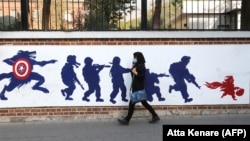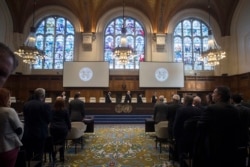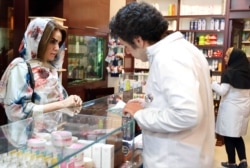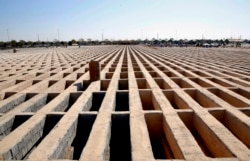Speaking in New York on November 4, Iran’s envoy to the United Nations Majid Takht Ravanchi accused the U.S. of violating the orders from the International Court of Justice (ICJ) – also known as the World Court – by imposing new sanctions against his country.
“Recently, in flagrant violation of the Court’s Order, the U.S. has intensified its pressures on the Iranian people in the midst of the pandemic outbreak, therefore exacerbating the situation with the intention to deprive Iran of accessing medicines, equipment and resources, which are much needed to effectively combat the deadly virus,” Takht Ravanchi said.
The statement is misleading.
Headquartered in The Hague, Netherlands, the World Court is the United Nations’ highest judicial body.
Iran appealed to the court in July 2018, asking it to order the U.S. to waive sanctions that President Donald Trump’s administration imposed that May after the U.S. pulled out from the 2015 treaty in which Iran had agreed to restrict its nuclear program.
Tehran claimed the U.S. sanctions violated Iran’s rights under a trade deal the U.S. signed with Iran in 1955 – the Treaty of Amity.
On October 3, 2018, the ICJ ruled that “some” of Iran’s assertions were “plausible” and that “restrictions on the importation and purchase of goods required for humanitarian needs, such as foodstuffs and medicines, including life-saving medicines, treatment for chronic disease or preventive care, and medical equipment, may have a serious detrimental impact on the health and lives of individuals on the territory of Iran.”
The ICJ said the U.S. “must remove, by means of its choosing, any impediments arising from the measures announced on 8 May 2018 to the free exportation to the territory of the Islamic Republic of Iran of (i) medicines and medical devices; (ii) foodstuffs and agricultural commodities.”
But the ICJ did not order the U.S. to remove all sanctions, as Iran had requested. Instead, the court called on both countries not to take any further steps that would escalate the situation.
The U.S. maintains that trade goods the court ordered excluded were originally listed as exempt.
As described in the 2013 U.S. Treasury Department’s guidance, “the U.S. maintains broad authorizations and exceptions that allow for the sale of food, medicine, and medical devices by U.S. persons or from the United States to Iran. U.S. sanctions laws provide similar allowances for sales of food, agricultural commodities, medicine, and medical devices to Iran by non-U.S. persons … this Guidance underscores that these sales to Iran do not trigger sanctions under U.S. law.”
Takht Ravanchi’s statement came roughly a month after the U.S., on October 8, announced another round of sanctions, blacklisting 18 major banks in Iran. U.S. Treasury Secretary Steve Mnuchin said the move would still allow for transactions involving humanitarian aid.
Nonetheless, experts interviewed by Reuters, Al Jazeera, the BBC and others, said that the latest sanctions “had effectively shut Iran out of the global financial system,” because they would allow the U.S. to also punish those who do business with those banks.
Reuters reported that “[t]he sanctions Trump has reinstated target everything from oil sales to shipping and financial activities. While they exempt food, medicine and other humanitarian supplies, many foreign banks are already deterred from doing business with the Islamic Republic - including for humanitarian deals.”
In Iran, the financial sanctions are seen as particularly harsh given the hit Iran has taken from the coronavirus. Iranian officials even called the U.S. measures “genocidal.”
Iran’s health ministry reported on November 5 that the death toll of COVID-19 in the country is nearing 40,000 with more than 650,000 cases of infection recorded.
On October 26, Iran's U.N. representative Mohammad Zareian told the General Assembly in New York that "[t]he broad limitations imposed on Iran as a result of cruel and illegal U.S. sanctions, prevent my country from purchasing medicines, medical equipment and other necessary supplies to face the pandemic."
Human Rights Watch said restrictions on financial operations make it difficult for Iran to import drugs: “The consequences of redoubled US sanctions, whether intentional or not, pose a serious threat to Iranians’ right to health and access to essential medicines.”
However, according to the Iranian Food and Drug Administration, Iran’s pharmaceutical companies are producing about 97 percent of the domestic market’s needed medicines and even exporting drugs to 30 countries.
As recently as March 2019, Iran reported $26 million worth of exports of medical equipment and drugs to Iraq.
Additionally, there have been persistent reports over many years that billions of dollars’ worth of medicine has been trafficked from Iran to Iraq. The latest report came on October 15, when Iranian military intelligence announced it had seized the “largest” cargo of drugs being smuggled from Iran to Iraq.
The “19 trucks loaded with thousands of pieces of medicine” had been intercepted on a route taken to avoid customs, the report said.
Iranian officials denied any ties to the cargo, saying that the consignments of medicine “were originally from other countries” and that attributing them to the Iranian government was “an international plot” by hostile countries.



